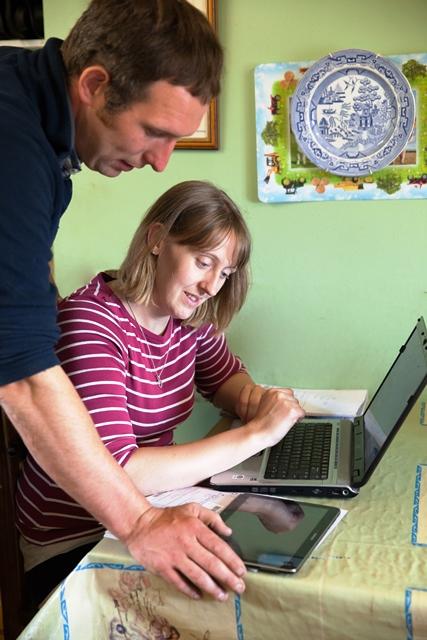Young farmer Dylan Hughes and his wife Hanna, both 29 years old, farm 64 acres near Holywell in Flintshire, a combination of owned and rented land. In recent years, the main farming enterprise has been the purchase of cross-bred calves to sell as 12-month stores.
Alongside this, the couple, who have three young sons under six, have established a successful agricultural engineering enterprise that repairs machinery for farms in the region. This family enterprise has expanded rapidly and Dylan’s younger brother Gethin (22) is employed to help with the increasing demand.
Dylan is keen to ensure that the farming enterprise keeps pace with the engineering business, so he sought business planning support through the Farming Connect Advisory Service, which is subsidised by up to 80% for eligible businesses. Farming Connect is funded by the Welsh Government and the European Agricultural Fund for Rural Development.
Dylan knew that in order to maximise the income and profit from the area farmed, he needed to expand the cattle enterprise. He had kept suckler cows on the holding until early 2015 but with limited land available for grazing he recognised that re-establishing a suckler herd was not going to be a viable option.
Dylan asked Graham Leaver of AgriPlan Cymru, one of the nine specialist consultancy companies approved to deliver the Advisory Service on behalf of Farming Connect, to conduct an in-depth analysis of every aspect of the business.
“Graham’s advice has been invaluable and armed with his business plan which provided us with a clear course of actions to take, we made a successful planning application for erecting a second cattle shed.
“This has enabled us to expand the existing calf enterprise which buys calves at four weeks of age, selling them on as 12-month store cattle,” said Dylan.
Dylan now has two cattle sheds of approximately 1,350 square foot each, both of which house 50 cattle over the winter. In the spring the cattle that are six months of age and older are turned out to grass and remain outside until the weather becomes too inclement or the grassland is too wet.
Having weighed up the capital investment against the expected rate of return, Graham advised Dylan to make a further planning application for a third livestock building as he feels this will increase the profitability of the business significantly.
“The next phase of development will hopefully result in him building a new smaller shed which will enable him to separate the calves from older stock. Ventilation and air flow will be a key component of the new build, and in addition to maintaining high standards of animal health and welfare, I believe Dylan will see increased growth rates as a result of this,” said Graham.
“Once the third shed is built, the number of calves bought and sold will be increased to 100 plus per year, and although the full financial benefit of this expansion is not expected to be seen until the summer of 2018, this is a long-term project which should show an excellent rate of return,” he added.
Dylan is a keen advocate of tapping into support and knowledge transfer services provided through Farming Connect.
“Thanks to training available through Farming Connect, we’ve been able to increase the skills set within the business across a number of areas.
“We are also seeing the benefits from soil sampling and silage testing carried out earlier this year and by increasing fertiliser levels, we’re expecting better volume and quality of grassland.”

